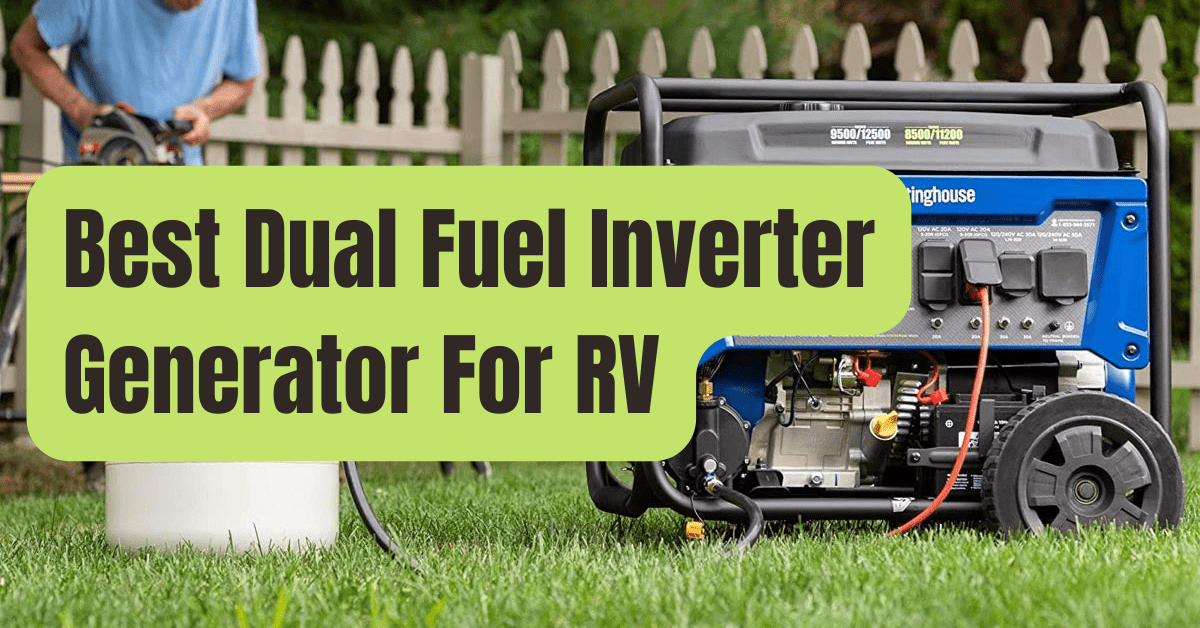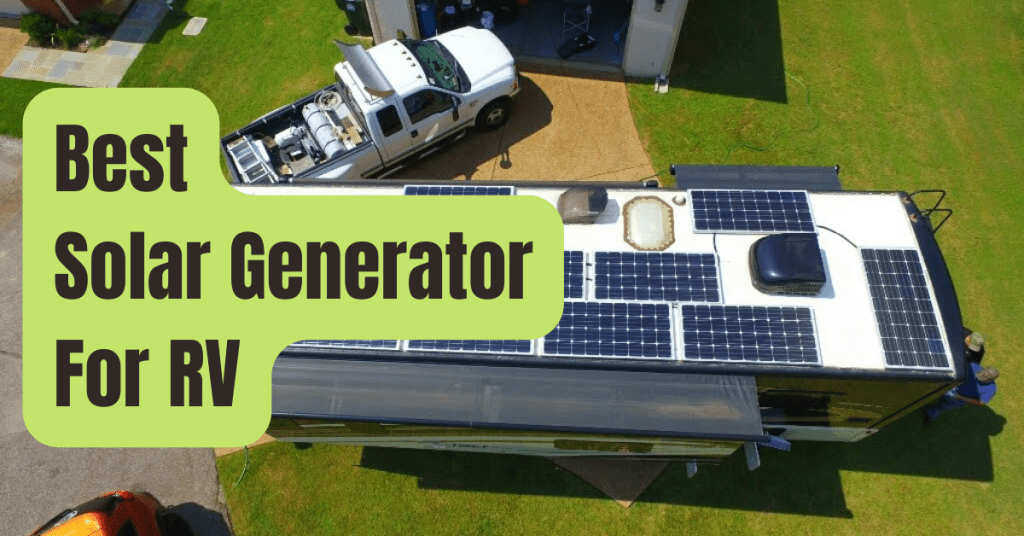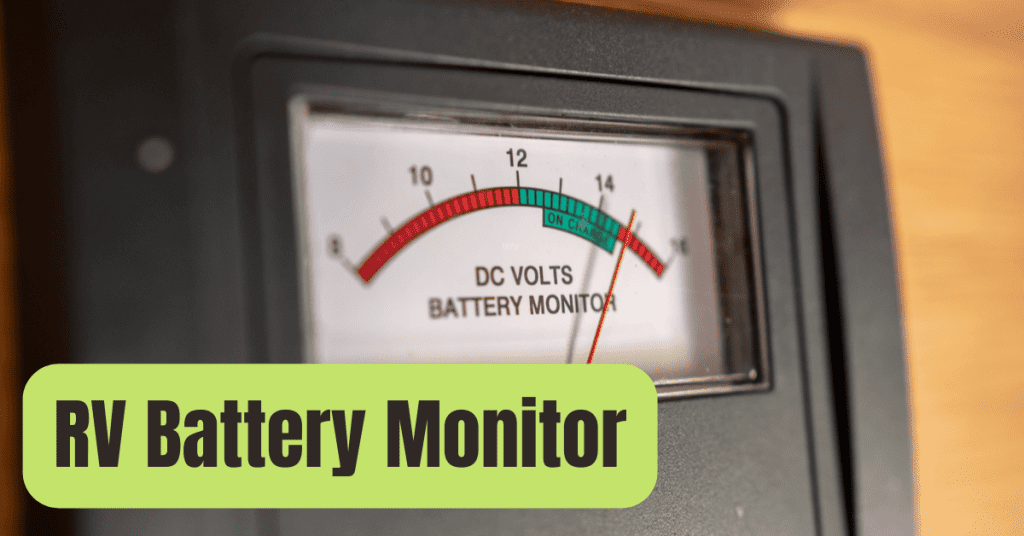When it comes to obtaining electricity off the grid, a dual fuel generator — one that operates on either gasoline or propane – is hard to match for adaptability and dependability.
In an emergency, dual fuel generators can power practically everything in your house, from appliances to heating systems.
Alternatively, whether you’re camping or RVing, a dual fuel generator enables you to enjoy the outdoors without sacrificing contemporary conveniences.
It might be difficult to choose the finest dual fuel generator for your requirements since there are so many possibilities on the market, some of which are highly specialized and others that are meant to adapt to any environment.
One of our main concerns in our dual fuel generator evaluation was starting and operating wattage on both gasoline and propane – the major factor deciding how many items you can power at the same time with the generator.
We also looked at the generator’s operating duration and the number of outlets it has, both of which might affect how beneficial it is for your unique requirements.
We read hundreds of customer reviews and spent 38 hours researching to come up with a list of our top selections for the best dual fuel generator.
The table below outlines the qualities that distinguish our eight preferred dual fuel generators presently on the market.
Continue reading for in-depth assessments of each generator, including the benefits and drawbacks of each type.
More information on how to pick the best dual fuel generator for your requirements may be found in our purchasing guide.
Finally, we’ll reveal our overall best dual fuel generator.
Review of the Top 8 Dual-Fuel Generators for 2026
#1. Champion 3400-Watt Dual Fuel Inverter, 100263
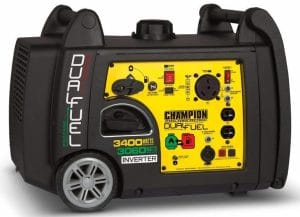
Features
- Starting (gasoline): 9.500W
- Running (gasoline): 7.500W
- Starting (propane): 8.550W
- Running (propane): 6.750W
- Run time at 1/4 load: up to 16 h
- Noise level: 74 dBA
- Outlets: two 5-20R 120V duplex, one L14-30R receptacles, two 5V USB ports
More features: Additional features include: clean electricity, a low oil shut-off sensor, recoil/electric start, variable engine speed, and EPA and CARB certification.
Although the output wattage of this Champion dual fuel generator isn’t as high as some of the other generators in our collection, the inverter generator mechanics set it apart.
It’s smaller and lighter than traditional generators, and it has wheels to make it easier to move about.
It’s perfect for those who require a generator that can travel between RVs and campgrounds regularly, for example.
The generator is also over 20 decibels quieter than traditional generators, running at 59 decibels.
This generator’s power output, at roughly 3,000 watts, isn’t enough to keep your house running, but it’s ideal for an RV.
Because the power varies so little between gasoline and propane, this machine is really dual fuel, allowing you to use whatever fuel is most convenient for you.
However, it doesn’t provide much more energy for starting motors, which might be an issue when using an air conditioner or mini-fridge.
Having just two conventional 120 V, 20 A outlets might be restrictive, but a power strip can alleviate this problem.
Why are we so taken aback?
- Electronics-friendly inverter generator with a consistent output.
- It works almost the same for both gasoline and propane.
- Small, lightweight, and whisper-quiet
What drawbacks should you be aware of?
- There are just two 120V/20A outlets.
- A little boost in initial power
#2.WGen7500DF (Westinghouse)
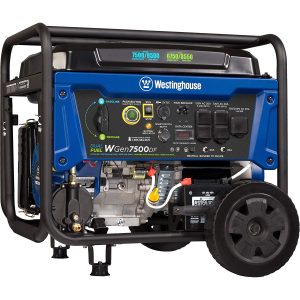
Features
- Starting (gasoline): 9.500W
- Running (gasoline): 7.500W
- Starting (propane): 8.550W
- Running (propane): 6.750W
- Run time at 1/4 load: up to 16 h
- Noise level: 74 dBA
- Outlets: two 5-20R 120V duplex, one L14-30R receptacles, two 5V USB ports
More features: EPA, CSA, and CARB compliance, 13 HP, push button and remote start, overload protection, and low-oil cutoff
This powerful dual fuel generator from Westinghouse has a lot of fans, and for good reason.
Although the power output isn’t as high as some of the more powerful generators in our collection, 7,500 W of continuous power on gasoline is more than enough to keep your house operating during an emergency and still have watts left over.
The runtime on either gasoline or propane is similarly good, at roughly 8 hours at 50% load.
Many user-friendly features are included in the generator, including a push-to-start electronic ignition similar to that used in current automobiles and even a remote start key fob.
The generator’s front has an easy-to-read digital runtime meter that indicates fuel levels.
There are five 120 V power outlets provided, as well as two USB connections for charging small gadgets – however these are unlikely to be used while the generator is outdoors.
The greatest disadvantage of this generator is that it is somewhat loud at 74 dB.
What sticks out the most?
- On gasoline, 7,500 W continuous power
- There are five 120-volt outlets.
- Remote start key fob with push-to-start ignition
What drawbacks did we manage to uncover?
- Noisy
#3. Pulsar G12KBN
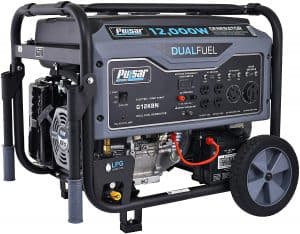
Features
- Starting (gasoline): 12000W
- Running (gasoline): 9500W
- Starting (propane): 10800W
- Running (propane): 8550W
- Run time at 1/2 load: 12 h
- Noise level:76 dBA
- Outlets: four 120V 20A AC outlets, one 120V/240V 30A twist-lock outlet, one 120V/240V 50A outlet, one 12V DC output
More features: CARB-compliant, including propane hose, low-oil shut-off, 3-in-1 digital meter, and automated voltage regulating
There are several factors that combine to make this one of the greatest generators available right now.
First and foremost, the design is stunning and very useful.
It has a comfortable handle and wheels that can easily travel on a variety of terrain.
This combination produces a portable generator that may be moved from one location to another.
One of the greatest engines at this pricing is under the hood.
A 457cc engine with up to 12000 peak watts and 9500 operating watts may be found here.
It’s worth noting that this is a dual-fuel generator.
As a result, it may be used with both propane and gasoline.
It produces 10800 peak watts and 8550 operating watts when driven by propane.
In any case, you have a generator that can power all of your household appliances.
The generator also has up to seven outputs, each of which provides enough channels to connect your desired gadgets.
There’s an 8 gallon tank, which means you’ll get a lot of use out of it.
You can get up to 12 hours of runtime with this model.
Out of all the choices we’ve looked at, this has the best runtime.
The safety measures are another aspect that you will like.
You also receive a voltage regulator and a low-oil shutdown.
What sticks out the most?
- Optional dual-fuel system
- A big fuel tank
- Exceptional runtime
- Large tyres
What drawbacks did we manage to uncover?
- Warranty period is limited.
#4. Champion 8000-Watt Dual Fuel Generator 100297
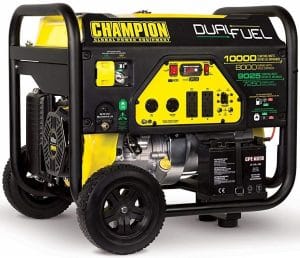
Features
- Starting (gasoline): 10.000W
- Running (gasoline): 8000W
- Starting (propane): 9035W
- Running (propane): 7250W
- Gasoline run time at 1/4 load: 8 h.
- Propane run time at 1/4 load: 5 h.
- Noise level: 74 dBA
- Outlets: 120V 30A locking outlet (L5-30R), a 120/240V 30A locking outlet (L14-30R), four 120V 20A GFCI protected household outlets (5-20R)
More features: Low oil shut-off sensor, Intelligauge, built-in surge protector; recoil/electric start; variable engine speed; EPA certified and CARB compliant
When utilizing gasoline, this tremendously powerful generator from Champion has a maximum output power of 10,000 W.
Because gasoline is substantially more efficient than diesel, you’ll probably want to use the more costly fuel everytime you use this generator.
The drawback to all of this power is that the runtimes are short – just eight hours on gasoline at 14 volts, and considerably less on propane at five volts.
As a result, this generator is perfect for events or construction locations where a lot of high-wattage equipment has to be powered for a short amount of time.
Importantly, the generator complies with CARB regulations, allowing it to be utilized in a variety of work situations.
It’s worth noting that Champion also makes less powerful generators, which you can learn more about in our Champion dual fuel generator reviews.
This generator comes with a number of useful features.
To keep track of how the generator is doing, use the Intelligauge display to effortlessly monitor output power and fuel levels.
The generator has many outputs, including a 240V outlet, and a built-in surge protector for further protection.
What makes it unique?
- On gasoline, it has a starting power of 10,000W.
- Display Intelligauge
- Surge protection and a 240V outlet
What are the shortcomings in the design?
- 8-hour runtime at 14% power on gasoline
- Large, bulky, and obnoxious
#5. DuroMax XP12000EH
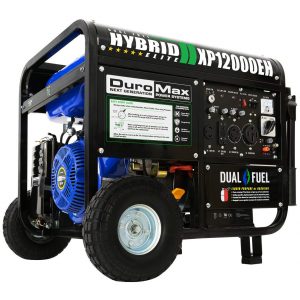
Features
- Starting (gasoline): 12.000W
- Running (gasoline): 9.500W
- Gasoline run time at 1/2 load: up to 8 h
- Propane run time at 1/2 load: up to 8 h
- Noise level: 72 dB
- Outlets: two 120V 20 Amp standard receptacles; 120v/240v 50 Amp heavy duty outlet, 120v/240v 30 Amp twist lock, 120v 30 Amp twist lock
More features: 18 HP, 120V/240V Voltage Selector Switch, Low Oil Protection, AC and DC Regulators, Spark Arrestor, Electric Start, Full EPA and CARB Compliance
This DuroMax generator is as strong as they come, and its 12,000 W of surge power will come in handy if you intend to utilize motor-driven appliances or equipment while also lighting field lights or your complete household’s worth of gadgets.
Unfortunately, DuroMax does not specify the continuous or surge watts for using this unit with propane, however customers have reported that it provides enough power to power a whole home.
Both gasoline and propane provide a continuous runtime of roughly eight hours, while a bigger propane tank may provide longer runtimes.
Despite its remarkable power output, this generator is not among the loudest on the market at 72 decibels.
It has a voltage selector, an electric start motor, and a variety of power outlets, allowing you to power practically any device without a hitch.
The sole disadvantage is the analog voltage display, which might be difficult to read and monitor.
The generator has received full EPA and CARB certification.
What sticks out the most?
- On gasoline, 12,000 W surge power and 9,500 W sustained power
- At half power, the battery will last for 8 hours.
- For the amount of power produced, it’s rather quiet.
What drawbacks did we manage to uncover?
- Voltage display in analog format
- When utilizing propane, there is a significant loss of power.
#6. DuroMax XP4400EH
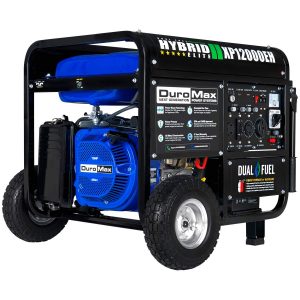
Features
- Starting (gasoline): 12.000W
- Running (gasoline): 9.500W
- Gasoline run time at 1/2 load: up to 8 h
- Propane run time at 1/2 load: up to 8 h
- Noise level: 72 dB
- Outlets: two 120V 20 Amp standard receptacles; 120v/240v 50 Amp heavy duty outlet, 120v/240v 30 Amp twist lock, 120v 30 Amp twist lock
More features: 7 HP, 120V/240V voltage selection switch, low oil protection, surge arrest, and noise reduction quiet muffler
This DuroMax fairly strong generator is a good choice if you don’t want to spend a lot of money on a generator.
When operating on gasoline, the generator produces 3,500 W constantly, and up to 2,800 W when running on propane, which is insufficient for most homes but sufficient for an RV setup.
The generator has a 10-hour runtime at half-power on both fuel sources, allowing it to operate for the most of the day.
One of the generator’s drawbacks is that it is quite loud (69 dB) and hefty (132 pounds) for the amount of electricity it produces.
It’s also worth noting that the generator isn’t CARB-certified, thus it can’t be used legally in California.
Because the voltage is shown using an analog needle, it might be difficult to discern how much power your appliances are drawing from the device and how much runtime you will receive.
The twist-lock outlet is certified for up to 240V for bigger appliances, and the two 120V, 20A outlets may be supplemented with a power strip to give extra outlets.
What makes it unique?
- Comparatively low-cost
- Power output is moderate.
- At 50% power, gasoline and propane have a 10 hour runtime.
What are the shortcomings in the design?
- Heavy and obnoxious
- Most houses do not have enough electricity to utilize.
#7. Champion Power Equipment 200961
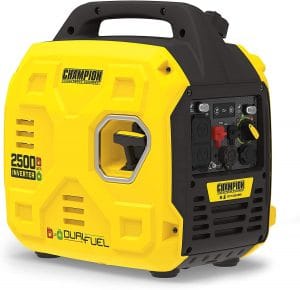
Features
- Starting: 2,500W
- Running: 1,850W (gasoline), 1,665 (propane)
- Gasoline run time at 1/2 load: up to 11.5 hours
- Propane run time at 1/2 load: up to 34 hours
- Noise level: 53 dBA
- Outlets: 120V 20A Duplex (5-20R), 12V DC Automotive, Parallel
More features: 120V, 60Hz, a classic inverter, recoil start, a 79cc 4-stroke engine, and low oil shut-off.
This is one of the most dependable power backup options available.
With its two covered home outlets, the Champion dual fuel generator provides clean electricity.
You may also buy a parallel kit that enables you to connect this inverter to another 2500-watt champion inverter to double your power outlet.
The generator comes completely constructed, making installation a breeze.
The built-in handle and lightweight construction make moving it from one location to another a breeze.
When utilizing the generator, you may connect all of your delicate equipment with confidence since it provides clean electricity.
The generator is powered by either gasoline or propane.
With a half load of gasoline, you can obtain up to 12 hours of electricity, but with the same quantity of propane, you can receive up to 34 hours of power.
Unlike other generators, it is very quiet, producing about 53dBA, or about the same amount of noise as a dishwasher.
This makes it ideal for outdoor usage, such as camping, hiking, or living in a vehicle.
It also has two USB connections that may be used to charge your phone, tablet, or laptop.
It’s also made with your safety in mind.
When it detects a low oil capacity, it immediately stops off.
The smart economy mode, which decreases the electrical burden, is another intriguing feature.
What makes it unique?
- This is the ideal generator for anybody who needs electricity on the move.
- Its revolutionary lightweight design makes it ideal for camping or tailgating.
- This is one of the finest portable dual-fuel generators for the money, with a 3-year guarantee.
What drawbacks did we discover?
- So far, there haven’t been any serious complaints regarding the generator.
#8. Sportsman GEN4000DF
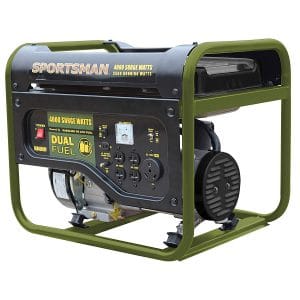
Features
- Starting: 4.000W
- Running: 3.500W
- Gasoline run time at 1/2 load: up to 10 h
- Propane run time at 1/2 load: up to 12 h
- Noise level: < 69 dB
- Outlets: four 120V AC outlets, one 120V RV outlet, one 12V DC outlet for battery
More features: 7 HP, recoil start, fuel gauge, and EPA approval.
This model, a smaller relative of Sportsman’s GEN7500DF, has many of the same design elements as the GEN7500DF but at a lesser price with an operating power output of 3,500 W on either gasoline or propane.
Despite the reduction in power due to a smaller gas reservoir, the runtime on the same canister of propane is greatly extended – up to 12 hours from 5 on the bigger model.
The generator is also substantially quieter than the bigger variant, at roughly 69 decibels.
The absence of wheels is one of the generator’s major design shortcomings.
Even if you don’t intend on moving the generator regularly, its weight of 90 pounds makes it virtually hard to transport without wheels, making it practically impossible to use with an RV — despite the supplied RV plug.
The generator, on the other hand, comes with a variety of power outlets as well as a 12V DC outlet for charging a battery.
What sticks out the most?
- On propane, a 12-hour runtime at 50% power is possible.
- Charge your batteries using a 12V DC outlet.
What drawbacks did we manage to uncover?
- Despite a 90-pound weight, there are no wheels.
Consider the Following:
How do you pick from the eight greatest dual fuel generators now on the market to locate the ideal one for your requirements now that you’ve been exposed to them? When selecting a dual fuel generator, our buying guide covers some of the most critical factors to consider.
What Are The Advantages Of Using A Dual-Fuel Generator?
It’s important that your generator can run on both gasoline and propane.
Apart from offering you the flexibility to switch between fuels when the price of gasoline and propane fluctuates, the two fuels have distinct advantages.
If you’re using your generator to power an RV or other portable setup, gasoline is easily accessible at any gas station.
Gasoline is also more efficient than propane and operates better in colder temperatures.
Propane, on the other hand, lasts far longer than gasoline, making it excellent for storing as an emergency backup fuel for a year or more around your home.
Propane is also less costly than gasoline in most cases.
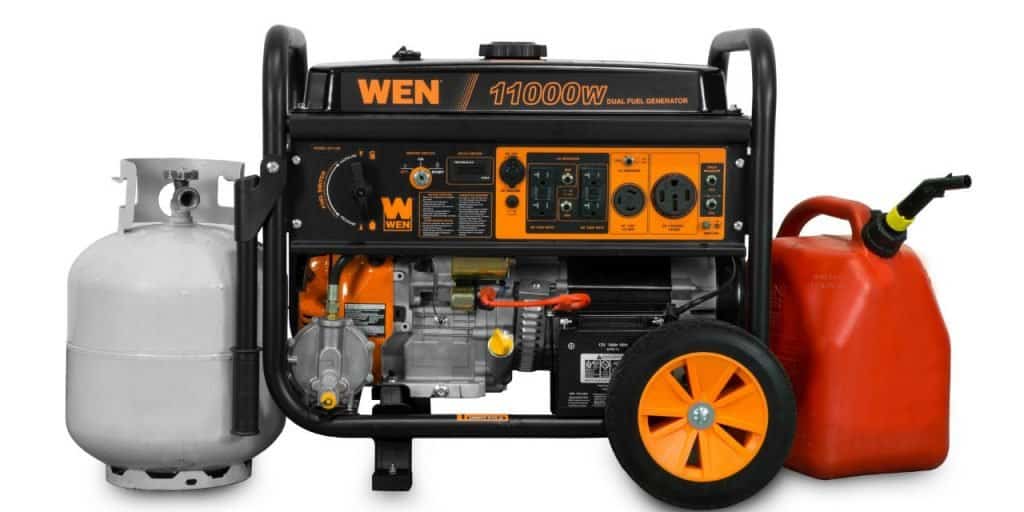
What Are Your Plans For Your Generator?
What criteria you should look for when deciding between models is primarily determined by how you want to utilize your generator.
Operating a generator to power your home when the electricity goes out is significantly different than powering an RV or a campground, both in terms of output wattage and desired duration.
Consider how long you’ll need to operate your generator constantly in the most severe scenarios for your planned use – and how much power you’ll need in these instances.
What Are Your Energy Requirements?
If you want to use your generator to power your whole home in an emergency, you’ll need one that generates at least 5,000 W – more if you have a water pump or an energy-intensive heating system.
A smaller type with a lesser power rating, such as a 2000-Watt generator, on the other hand, is more portable but is better suited to powering an RV or a campground.
Furthermore, if you know you’ll be using either gasoline or propane nearly entirely, you may only need to think about how much power the generator produces on one fuel rather than how effectively it balances both.
If you need even more adaptability and power, consider investing in a tri-fuel generator.
Depending on your application, runtime is also crucial.
You’ll need a generator with a lengthy runtime of 10–12 hours at half power if you want to power your home and keep everything running regularly.
However, if you’re driving an RV and just require electricity for a few brief periods of time, such as in the morning and evening, runtime may not be an issue.

Inverter Compared Vs. Conventional Generator
Both conventional and inverter generators produce AC power – the same sort of electricity that comes from your wall socket – but the mechanisms vary sufficiently that conventional and inverter generators perform differently in reality.
Inverter generators are often built to be more small, lightweight, and quieter than traditional generators, which might be beneficial if you’re transporting your generator rather than maintaining it in a permanent spot or operating it in a public campground.
Inverter generators, on the other hand, often have smaller fuel reservoirs – and hence shorter run periods – as well as lower power outputs, while being more fuel-efficient than traditional generators.
Inverter generators may be operated in parallel to boost power production, but traditional generators are limited to the wattage they are rated for.
Most users will not take use of this design feature.
Propane Vs. Gasoline
Both gasoline and propane have their benefits and drawbacks.
Gasoline is usually much more costly than propane, but it is simpler to get by and burns more effectively, particularly in colder temperatures.
However, compared to propane, gasoline has a shorter shelf life and is practically hard to get in an emergency, making propane a superior alternative for emergency preparedness.
If this seems to be an option you’d want to pursue, read our propane generator reviews.
Conclusion
When you’re off the grid, whether on an RV vacation or during a power outage, a dual power fuel generator is a great option to create energy.
The ability to run your generator with either gasoline or propane gives you more freedom than a standard gasoline generator, allowing you to pick the fuel that best suits your requirements in any given circumstance.
Our buying guide and overview of the eight finest dual fuel generators on the market make it simple to choose the dual fuel generator that’s appropriate for your next camping trip, disaster preparedness, or anything else you need portable electricity for.

